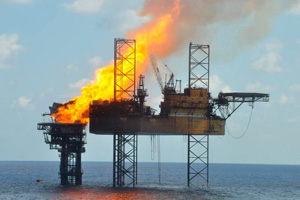![]() Isn’t it strange that, no matter how terrible the news from the Gulf, the media still can’t help offering a lurking, BP-influenced narrative of hope? Here’s a recent headline from my hometown paper, for instance: “Signs of Hope as BP Captures Record Oil Amounts.” The piece is based on a BP report that, last Thursday, its woefully inadequate, ill-fitting “top hat” had captured more than 25,000 barrels of the gushing oil—that is, five times more than it long claimed was spewing from its busted well (25 times more than it originally suggested).
Isn’t it strange that, no matter how terrible the news from the Gulf, the media still can’t help offering a lurking, BP-influenced narrative of hope? Here’s a recent headline from my hometown paper, for instance: “Signs of Hope as BP Captures Record Oil Amounts.” The piece is based on a BP report that, last Thursday, its woefully inadequate, ill-fitting “top hat” had captured more than 25,000 barrels of the gushing oil—that is, five times more than it long claimed was spewing from its busted well (25 times more than it originally suggested).
With semi-official estimates in the range of 35,000-60,000 barrels escaping a day (and those numbers regularly on the rise), this represents a strange version of hopeful news. Ominously enough, by the end of July, with a new, larger, “tighter” cap theoretically in place, BP is aiming to capture up to 80,000 barrels a day (that is, 20,000 barrels more than it has publicly acknowledged might possibly be spewing from the floor of the Gulf). In all such articles, the real narrative of hope, however, involves the relief wells, the first of which is now within “200 feet” of the busted well. Usually, the date for one of those wells to plug the leak is given as “early August” or “mid-August” and it’s regularly said that the drilling of those wells is advancing “ahead of schedule.”
Whatever “signs of hope” do exist, however, they’re already badly beslimed by on-gushing reality. On the very day that BP announced its 25,000-barrel capture, huge amounts of methane were also reported to be pouring into the Gulf. Until now, this had evidently been largely overlooked (or under-reported), even though methane in high concentrations can deplete water of its oxygen and so suffocate marine life, creating vast dead zones and inhibiting the natural breakdown of the spilling oil. According to John Kessler, a Texas A&M oceanographer, the Deepwater Horizon spill represents “the most vigorous methane eruption in modern human history.”
Meanwhile, if you read carefully, you’ll note that those relief wells are no sure thing. They might not do the job until the fall or even, worst-case scenario, Christmas, or (even-worse-case scenario) they might fail entirely, leaving the well to spew oil and natural gas (with its methane) for an estimated two to four more years. And let’s not forget general bad weather, as well as hurricane season bearing down on the Gulf, the possibility that the well’s casing might be cracking or eroding—meaning even more spillage or seepage—and that a “clean-up” in which, in Interior Secretary Ken Salazar’s words, the Gulf ecosystem would be “restored and made whole,” may not, as Naomi Klein wrote recently, be “remotely possible, at least not in a time frame we can easily wrap our heads around.”














